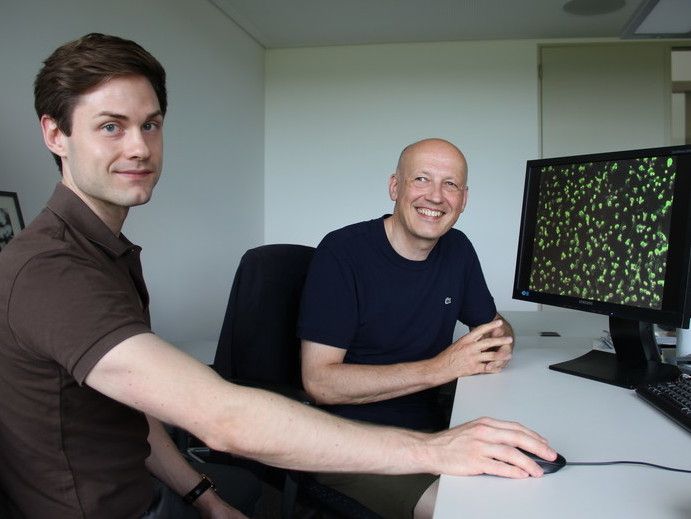Rapid test for the determination of antibodies against Sars-Cov-2
No elaborate biosafety precautions are necessary
To determine immunity to SARS-CoV-2 and the effectiveness of potential vaccines, the amount of neutralising antibodies in the blood of recovered or vaccinated individuals must be determined. A traditional neutralisation test usually takes two to three days and must be carried out with infectious coronaviruses in a laboratory complying to biosafety level 3. A Swiss-German research team from Bern and Bochum has launched a test that takes only 18 hours and doesn’t have high biosafety requirements.

Ferdinand Zettl and Gert Zimmer of the IVI in front of an image of the test developed by them with green fluorescent cells.
© FSVO/Renate Boss
The test was developed at the Institute of Virology and Immunology (IVI) of the University of Bern and the Swiss Federal Office for Food Safety and Animal Health, and evaluated in cooperation with colleagues from the Ruhr-Universität Bochum (RUB) using serum samples from Covid-19 patients.
Disguising a harmless virus as Sars-Cov-2
In order to detect antibodies against Sars-Cov-2, the researchers used another virus that doesn’t propagate. They exchanged the envelope protein of this virus for the spike protein of the novel coronavirus, which mediates virus entry and infection. “As a result, the viruses can be identified by antibodies against Sars-Cov-2,” explains lead author Toni-Luise Meister from the Department of Molecular and Medical Virology at Ruhr-Universität Bochum. “The antibodies bind to the viruses that have been altered in this way and neutralise them so that no longer can penetrate the host cells.”
Luminescence helps determine immunity
Since the virus pseudotyped in this way can’t propagate in host cells, no elaborate biosafety precautions are necessary for the test. In order to determine the amount of antibodies, the researchers genetically modified the virus so that green fluorescent protein and a luciferase, an enzyme from fireflies, will be produced by infected cells. “After a single round of infection, we can then determine how many cells show green fluorescence,” says lead author Ferdinand Zettl from the Institute of Virology and Immunology in Bern. The green fluorescence is an indicator of infection with the pseudotyped virus. The less green cells the researchers are finding, the more neutralizing antibodies are present which blocked the virus. In addition, a luminometer may be used to read the luminescence signal produced by the luciferase enzyme – another way of evaluating the test.
Quick and reliable
In order to check the reliability and comparability with the conventional neutralisation test, the researchers applied it to blood samples from Covid-19 patients. “The direct comparison showed a good correlation between the two test systems,” explains corresponding author Professor Stephanie Pfänder from the Department of Molecular and Medical Virology at RUB. Compared to 56 hours for the conventional test, the new test is much faster, with only 18 hours to the test result. “Another great advantage is that it can be carried out in almost all medical labs, because no sophisticated safety precautions are necessary,” points out Dr. Gert Zimmer from the Institute of Virology and Immunology in Bern, corresponding author of the study.
Original publication
Other news from the department science

Get the analytics and lab tech industry in your inbox
By submitting this form you agree that LUMITOS AG will send you the newsletter(s) selected above by email. Your data will not be passed on to third parties. Your data will be stored and processed in accordance with our data protection regulations. LUMITOS may contact you by email for the purpose of advertising or market and opinion surveys. You can revoke your consent at any time without giving reasons to LUMITOS AG, Ernst-Augustin-Str. 2, 12489 Berlin, Germany or by e-mail at revoke@lumitos.com with effect for the future. In addition, each email contains a link to unsubscribe from the corresponding newsletter.
























































